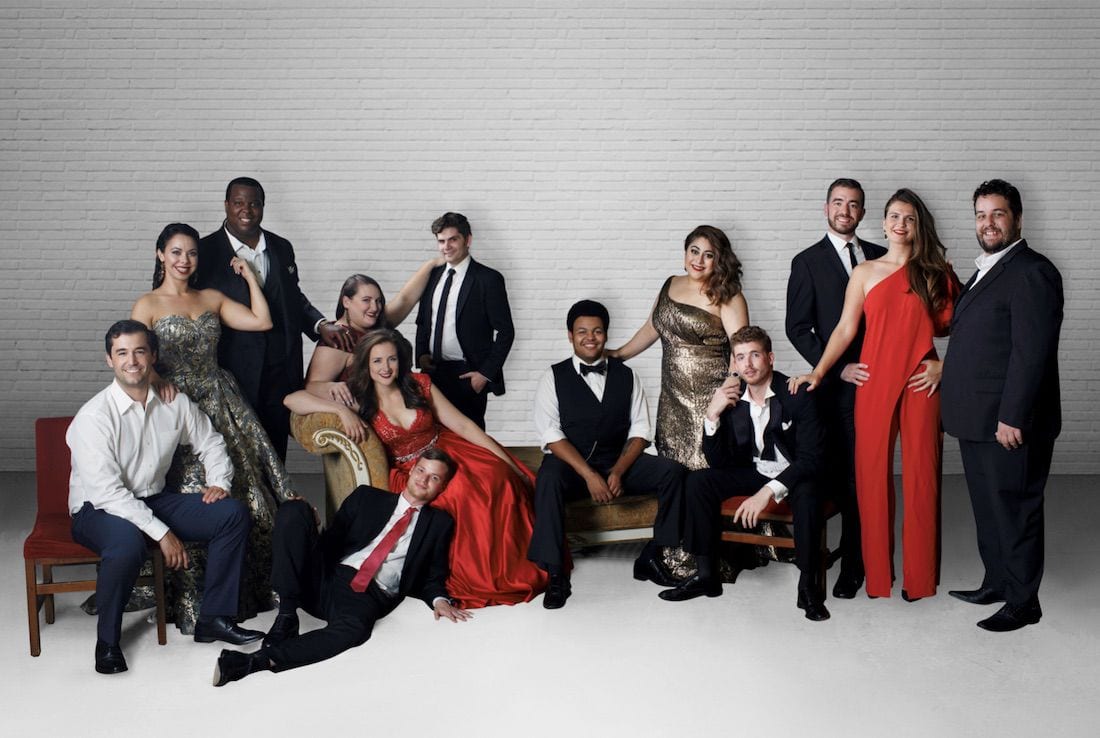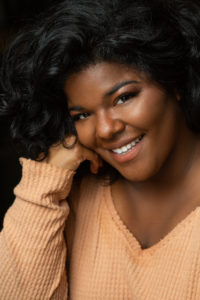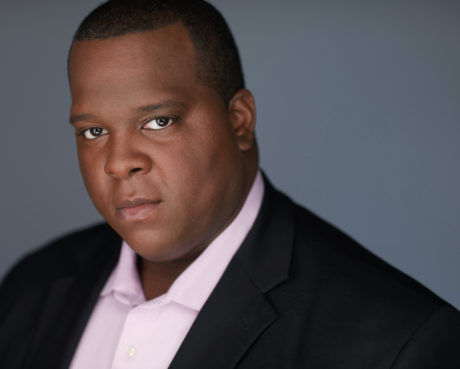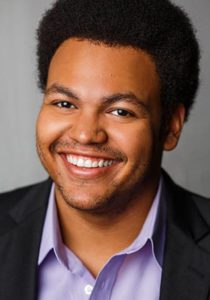You’d have to be dead not to enjoy a recital of the caliber given this past Sunday in the Phillips Collection Music Room by members of the current class of Washington National Opera’s Cafritz Young Artists Program. Yet while there is much good to share about this recital featuring an all African-American lineup of singers, its context is worth unpacking first.

Riffs and Relations, the recital, was conceived of by CYAP and the American Opera Initiative director Robert Ainsley as an adjunct to the Phillips’ current exhibit of the same name. It’s the third such collaboration between the young singers’ program and the museum, part of a larger trend nationally of upping opera and art song’s cultural relevance to modern-day audiences.
Through music and visual art, Riffs and Relations showcases how 20th- and 21st-century African American artists have both worked within and without European traditions, telling the story of our shared history, but from a different perspective.
In jazz, a riff is not tangential, but one performer’s interpretation of what is happening when the musicians come together as a whole. Ainsley’s selection of plantation songs and spirituals, ragtime numbers, romantic works, and bluesy numbers aptly demonstrated that the sound of black artists reinventing white points of view isn’t the sound of the “other” but the sound of us all.
Every piece, some of which were composed by white American and European men who’d integrated African themes into their own styles, sounded familiar even if the work was new to the listener because black music is America’s indigenous music. As Ainsley’s excellent program notes pointed out, “most modern music, whether classical or popular, is rooted in the rhythms, blue notes, and call-and-response of African tradition.”
At the turn of the last century, African-American composers such as Louis Moreau Gottschalk, Scott Joplin, William Grant Still, Samuel Coleridge-Taylor, and Florence Price, among others, created a distinct American sound by weaving African rhythms, call-and-response, blue notes, stride piano, and ragtime together with classical composition forms and chords.
Their finely wrought works demonstrate the richness of history we’ve until recently denied ourselves in this country, since African-American composers are rarely heard in the programming of any of our national symphony orchestras. Why is that?

Since our conservatories have tended to favor Western European composers, as music historian Joseph Horowitz told me recently, that’s pretty much all American musicians, conductors, and orchestra administrators know. That we don’t have our own American canon instead of one replete with Germanic gestures and Nordic fairytales, much as we love them, is because racism in the late 19th and early 20th centuries precluded our quite talented black composers from getting their due.
Although this course correction is taking place in pockets all around the country, the CYAP with this recital, the WNO with its recent commissioning of the opera Blue which explores racial themes, an upcoming production of Gershwin’s all-black cast opera Porgy and Bess, as well as the AOI’s recent staging of Carlos Simon and Sandra Seaton’s Night Trip that lays bare the pernicious threats blacks in America face daily, all add up to their leading the trend is encouraging. As the nation’s capital where resources for the arts are more plentiful than in many other communities, and where national policy is set, why shouldn’t our musical institutions be at the forefront of once and for all admitting the seminal role of black artists in the creation of the American classical sound?
As for the concert, it was ridiculously good. Demonstrating the sassy, sad, moving, fiery, funny, and thrilling nature of our musical heritage, each of the four singers and their accompanist, Thomas Morris, polished these nuggets of song so they dazzled. The whole concert was brilliant, but some moments stand out.
American baritone Joshua Conyers gave a rousing version of Aaron Copland’s setting of the minstrel show tune, “The Boatman’s Dance,” finishing with such a stentorian flourish it was hard to think where the energy might possibly go from there. I’ve had the pleasure of listening to Conyers in a number of different roles for two years now, but this was the first I had heard him in an intimate setting where his voice, though plenty big, could truly resonate and fill the space. The smaller venue suited him allowing a richer tone and timbre I had not previously heard in his voice to shine through.

Where all that energy led was to another booming performance, this one by American mezzo-soprano Rehanna Thelwell in Louis Moreau Gottschalk’s “O Loving Heart, Trust On.” It’s impossible not to compare Thelwell’s titanic sound to that of another big-voiced American mezzo, the late Jessye Norman. Thelwell sang the wistful work with tenderness, but her thunderous delivery was more reminiscent of gospel singing than it was a quiet meditation on faith. That’s okay. Given Thelwell’s level of craft, it was great.
American mezzo-soprano Amanda Lynn Bottoms leads with smarts and steel when she sings, but a lack of affectation made her delivery of Darius Milhaud’s “Chansons de négresse” (Songs of the Blackwoman), more poignant as she depicted the string of cruel deceptions that enslave her always at the moment she thinks she is about to be free.
When Thelwell joined Conyers for the plaintive “I Want to See My Child” by Scott Joplin, only to return one song later to give a Lizzo-worthy, comedic hair-tossing performance of Satie’s “La diva de l’empire,” she proved she is a consummate actress. How she wasn’t wrecked by the excruciatingly sad text of the Joplin signifies her emotional discipline.
Speaking of Norman, her frequent accompanist, the late American pianist Dalton Baldwin came to mind listening to Morris at the piano in this program. In William Bolcom’s “Graceful Ghost Rag,” Morris was allowed the spotlight for his dexterous solo playing, but when paired with British-American tenor Joshua Blue for the runaway thriller that is H. Leslie Adams’ “Creole Girl,” Morris was either going to balance Blue’s urgency or run them both off the cliff. Baldwin would never let such a thing happen, and neither did Morris.

Blue, of course, is fantastic. I am not the first, nor the last, to say it. But I will “go there” and bring up the name that was conspicuously missing from all the programming materials, that of Plácido Domingo. It hasn’t even been a week that the WNO and its subsidiaries announced they were dropping Domingo’s name from the young artists’ program, and already it’s difficult to find evidence it was ever there at all. If I think only of how Domingo sounded when he sang, not of how justice at last has been served for his countless sexual acts of aggression, then I am sad such a bulwark of opera has fallen. I won’t pretend that Domingo’s extraordinary voice wasn’t one I thrilled to hear. Domingo figures prominently in my music library.
What will become of his musical legacy? Time will tell, but I do hear his potential vocal successor in Blue with his confident sound redolent with pathos and power. Blue’s assured singing of “Creole Girl,” a bracing song of longing for one’s soulful heritage, brought the crowd to its feet and earned him an encore, George Gershwin’s “I Got Rhythm.”
A final thought about Domingo. Aside from the #MeToo movement, Millennial singers are coming of age at a time when training programs such as CYAP are more comprehensive than in the past. Singers are taught life skills as well as vocal ones, and are accepted into programs not just for their voice, but for how they will contribute to the profession. In that light, while operaphiles may miss Domingo’s stunning sound, the obvious conclusion is that keeping his name on a future-oriented training program would have made no sense.
Hearing our nation’s tremendous legacy of musicianship being carried forward in recitals like Riffs and Relations not only satisfies our need for beautiful music, it is a harbinger of hope that we can look forward to an increased emphasis on black Americans’ contributions to our unique, non-Eurocentric, musical canon. The more it happens, the more accurate – and entertaining – our cultural history will be.
Running Time: 70 minutes, with no intermission.
The Washington National Opera’s Cafritz Young Artists Program performed Riffs and Relations at the Phillips Collection on Sunday, March 8, 2020, at 4 p.m.
Songs included in the program:
- “The Boatman’s Dance” (Copland) (Joshua Conyers)
- “O Loving Heart, Trust On” (Gottschalk) (Rehanna Thelwell)
- “Mon histoire,” “Adandonée”, “Sans feu ni lieu” from Trois chansons de négresse (Milhaud) (Amanda Lynn Bottoms)
- “I Want to See My Child” (Joplin) (Thelwell, Conyers)
- “Graceful Ghost Rag” (Bolcom) (piano, Thomas Morris)
- “La diva de l’empire” (Satie) (Thelwell)
- “Onaway! Awake, beloved!” (Coleridge-Taylor) (Joshua Blue)
- “Frühlingsmorgen” (Mahler) (Bottoms)
- “Chanson Romanesque,” “Chanson à boire” (Ravel) (Conyers)
- “I’m a Stranger Here Myself” (Weill) (Bottoms)
- “Croon-Spoon” (Blitzstein) (Thelwell, Conyers)
- “Hôtel” (Poulenc) (Conyers)
- “If You Should Go,” “Black Pierrot” (Still) (Blue)
- “Night” (Price) (Conyers)
- “Creole Girl” (Adams) (Blue)
- “Good News” (Boatner) (Bottoms)
- “Joshua Fit de Battle of Jericho” (Hayes) (Conyers)
- “In the Morning: (Ives) (Thelwell)
- “Toccata” (Carter) (Blue)
- Encore: “I Got Rhythm” (Gershwin) (Blue)




